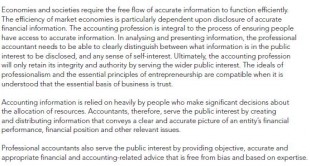Prepare your CPA summary notes quickly and effectively using this method, and let KnowledgEquity help you with your CPA studies.
CPA summary notes or index?
Students ask whether they should create an index (or just grab one from another student and use it) or if they should prepare summary notes.
I think both are valuable, but the first step should be to create CPA summary notes for each module.
We have prepared a detailed guideline with examples based on Ethics and Governance Module 1 which we think will be helpful for you. Only once you have created your summary notes should you consider index creation.
Overview of preparing CPA summary notes
We often advise CPA students on how important it is to prepare module summaries – using your own words, not just borrowing notes from someone else. The benefit of summarising comes from:
- Spending time carefully reading and thinking how to ‘reduce’ the content into a summary
- Reviewing the summary at a later date to help remember all the knowledge
This is a key difference between ‘reading’ and ‘studying’.
To help you start preparing your own summaries – we have produce an example based on Ethics & Governance Module 1, so you can see what to do, and how beneficial it will be.
Steps to follow when preparing a summary of a CPA summary notes for a module
Step 1: Put some key facts about the Module at the top of the summary.
- Module title
- Brief description of the purpose of the module (get this from the ‘subject outline’)
- Length of the Module
- Exam weighting and estimated study time
- Number of objectives and estimated number of marks on exam
Step 2: Prepare the sub-headings in your document, based on the Module contents listing.
Step 3: Prepare objectives sub-headings. This is where you can put down your notes on these objectives – to demonstrate you have summarised them properly, and understand them.
Step 4: Read a paragraph. Think about what the key point of the paragraph is. Write it in your own words. Aim to do it in only one sentence, with a maximum of 2 or 3 sentences.
EXAMPLE – CPA Ethics & Governance MODULE 1 – Accounting & Society
| Purpose of Module: | Consider what it means to be a professional accountant, and the skills required. Understand it is more than technical ability – there is a social and ethical impact as well. Consider criticisms of accountants and the responses by the profession. |
| Length: | Approximately 50 pages + solutions |
| Exam weighting & estimated study time | 15%
16.5 hours (15% of 110 hours) |
| Number of objectives & estimated questions: | 5 objectives and approximately 13 / 85 marks
(i.e. expect 2 or 3 marks per objective) |
Preview & Introduction
[Here is an example of a short summary of the half page Preview/Introduction]
Focus is on ‘what is a profession?’, the nature of the accounting profession, our links with society, and significant challenges that have harmed credibility.
PART A: Accountants as members of a profession
[Insert all the topic headings – to guide you with remembering and understanding content]
Key point: Accountants help people make decisions, so they should act in a professional and ethical manner. So – we must understand what it means to be professional.
Public interest or self-interest?
Here is an extract of 3 paragraphs from the CPA Australia Ethics and Governance study Guide (2016), page 19.
There are 120 + 46 + 27 = 193 words. Below is an example of how to summarise this into just 58 words:
Society and economies need financial information. The accounting profession is very important and could cause significant harm with poor reporting. Great benefits arise from reporting well. If we are deceptive we will have no credibility. Accounting serves the public interest by providing information that is objective, accurate and useful so people make better decisions about important economic items.
To take the example further – here is an example of 1 CPA Page summarised (page 19) = now only 166 words
Preview & Introduction
Focus is on ‘what is a profession?’, the nature of the accounting profession, our links with society, and significant challenges that have harmed credibility.
PART A: Accountants as members of a profession
Key point: Accountants help people make decisions, so they should act in a professional and ethical manner. So – we must understand what it means to be professional.
Public interest or self-interest?
Society and economies need financial information. The accounting profession is very important and could cause significant harm with poor reporting. Great benefits arise from reporting well. If we are deceptive we will have no credibility. Accounting serves the public interest by providing information that is objective, accurate and useful so people make better decisions about important economic items.
Altruism is linked to integrity, objectivity and being without bias. It links with ‘public interest’.
Altruism = action that brings no benefit to an individual, and may even be at their own expense.
However – self-interest may be the driving motivation, not altruism.
Now over to you…
So the aim for you is to try and summarise Module 1, which is about 50 pages long into some that is only 10 – 12 pages long.
PREPARING CPA SUMMARY NOTES WILL TAKE YOU QUITE A LONG TIME. But, this is ‘studying’ not ‘reading’ and this is how you end up learning the material really well and not ‘forgetting’ it as soon as you put the book down.
Then – when you start revising for your exam – you will have about 70 – 100 pages to read – in your own words, and it will sink in much deeper than ever before.
Regards, Courtney Clowes
KnowledgEquity
We are the Official Learning Partner of CPA Australia, and have highly qualified CPAs creating and delivering innovative content including recorded webinars, video tutorials, PDF resources to download and practice exams.
Your CPA Guided Learning Support is available via MYOL. It’s part of your tuition fees. Just go to CPA my online learning, select the subject you are enrolled in and find our link under the heading Guided Learning Support. It’s really that easy!
9 responses on "CPA summary notes or index?"
Leave a Message
You must be logged in to post a comment.




Thanks for that Courtney. Having just completed an MPA, I have a study routine that is quite similar and it’s nice to know that I don’t really have to change the way I work as I approach this next level of study
I want to join class for gsl for semester 1, let me know fees
Hi Neha, you can sign up for Exam Ready which includes 2 practice exams (1 based on the CPA GSL Pre-seen) and also access our case analysis template, which will include sections filled in based on the CPA GSL Pre-seen cases. This is only $295 at the moment. Here is the link: https://knowledgequity.com.au/global-strategy-leadership/
Hi, I have signed up for free EG assist. However, I am not able to access module 2 to module 4 content and quizzes (including webinar) may I know what is the reason for it?
Hi Christina,
Assist only has 1 module of content. If you are enrolled with CPA you get free access via the CPA Website (MYOL).
Regards, Courtney
Hi Courtney,
I liked the idea of making index and summary notes. However, I am wondering if we use the indexes already being developed towards the end page of the textbook? Preparing one myself will be a good idea or just get used to to the one which is already there. Thank you.
Hi Kinley,
Yes this is a good idea. Just grab the index at the back of the book, and then you can add to that as needed.
I think the best part of creating the index and summary is the work of stopping, thinking about a word or concept, and then putting it into your own words. So, you end up learning it really well. Then, skimming over the summary during semester helps refresh your memory. So, by the time you get to the exam you don’t even really need to look at it – you just know it.
Regards, Courtney
Hi Courtney,
Thanks for your reply on my earlier query. Just wanted to ask you another question, that I am following the guided learning which is really helpful. Lets say I finished the module 3 Part A (Watched all the short videos, read the book- highlighted the key words and made the index, come back and watch the webinar) and attempt any quizzes if there is any. By doing this am I leaving behind any important links or areas where i should focus? I see that there are some links to the case study and there are heaps under CPA Learning task(after login). But these are not marked or arranged as per the module. I am guessing if I should check on these after i finish module 6 or should I go together. Thank you.
Hi Kinley,
Can you post this in the EG Facebook group, because replying to comments here is very difficult. Regards, Courtney